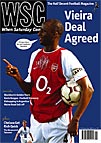 Can Roman buy the Premiership? One man did just that and Ray Chenery can't see anything wrong with the transformation of Blackburn wrought by the late Jack Walker
Can Roman buy the Premiership? One man did just that and Ray Chenery can't see anything wrong with the transformation of Blackburn wrought by the late Jack Walker
Back in the 1970s, when Match of the Day was king, they’d show the top of the table in each division. And occasionally Blackburn Rovers’ name was there, mostly in their Third Division days, for all the nation to see. I remember being envious of the teams who seemed always to feature near the top of the Second – why couldn’t we ever do that? And then we did; in each of the three seasons from 1987 to 1990, under the guidance of Don Mackay, a good and imaginative manager, we reached, but failed, in the play-offs for promotion to the First. By January 1991, however, we were 20th in Division Two. But that was the January that Jack Walker took control of Blackburn Rovers.
Have you ever heard a phone-in programme in which someone didn’t refer to him? Like Bosman, he is no longer a person but a form of shorthand. A Jack Walker is a benefactor, a miracle worker with bottomless pockets. The usual figure put on his wealth then, just after he sold his steel business, was £300 millionish – not in the Russian class, but enough.
He had already given us the steel with which to build the then-new Riverside Stand; now he really opened his wallet and rummaged about a bit. Mackay, who had done well but not quite well enough for a rich man in a hurry, was dropped after three matches of the new season, to be replaced shortly by Kenny Dalglish. Dalglish! At crumbling, homely, the-pies-are-good Ewood Park! Then it all happened so quickly – Colin Hendry returned and we got our first million-pound signing, Mike Newell; other good players were quickly added to the existing decent squad. Then, promotion, a rebuilt stadium and a youngster called Shearer.
A team is injected with sudden wealth and spends it with abandon. A good thing for Rovers fans? Can it be doubted? For fans of other clubs? Well, we weren’t Man Utd, were we? There were drawbacks. For one thing, people, coached by the press, didn’t seem to give us full credit. We “bought success” – as if Real Madrid, Man Utd and the rest haven’t bought success with much more money over a much longer time. As if every football club at any level doesn’t try to buy success with whatever funds it can scrape together. Oh, yes, they said, you can buy the players, but can you mould them into a team? Well, in three seasons the Rovers finished fourth, second and first in the Premiership. Of course they were good – surely the last town team ever to win the title?
What eventually let us down was not the money but the speed of success and our unfamiliarity with the high life; we were nouveaux riches in the world of the landed gentry and we didn’t really know how things were done, how one retained that effortless superiority. For me, at least, there was the niggling feeling that perhaps we weren’t doing it properly, that we should have escaped the Second Division by persevering with hard work, good husbandry and finding players in Accrington or Oswaldtwistle. After all, Oldham and Barnsley came up…
Now I think we’ve stabilised in the upper-middle class of the Premiership. We’ve been relegated, so shouldn’t be complacent, but after the rollercoaster ride things now look steady. Uncle Jack has gone, but he’s left us well provided for. I don’t know the figures, but I believe we have a solid rather than spectacular fund which we seem to be managing well.
It was a revolution. I don’t think there’s a club in the country which has been changed so fundamentally in such a short time. Whatever is regrettable – ridiculous wages and ticket prices, for example – is the product of modern football, not Jack Walker’s money, though I suppose he did his bit to up the ante.
It’s nice sometimes to revisit in memory the draughty and leaky old Darwen End, or huddle in the back of that silly concrete stand at the Blackburn End, or pee in the roofless urinals on the Riverside. But only in memory. Who needs oil billionaires when you’ve got a rich Lancashire lad?
From WSC 199 September 2003. What was happening this month